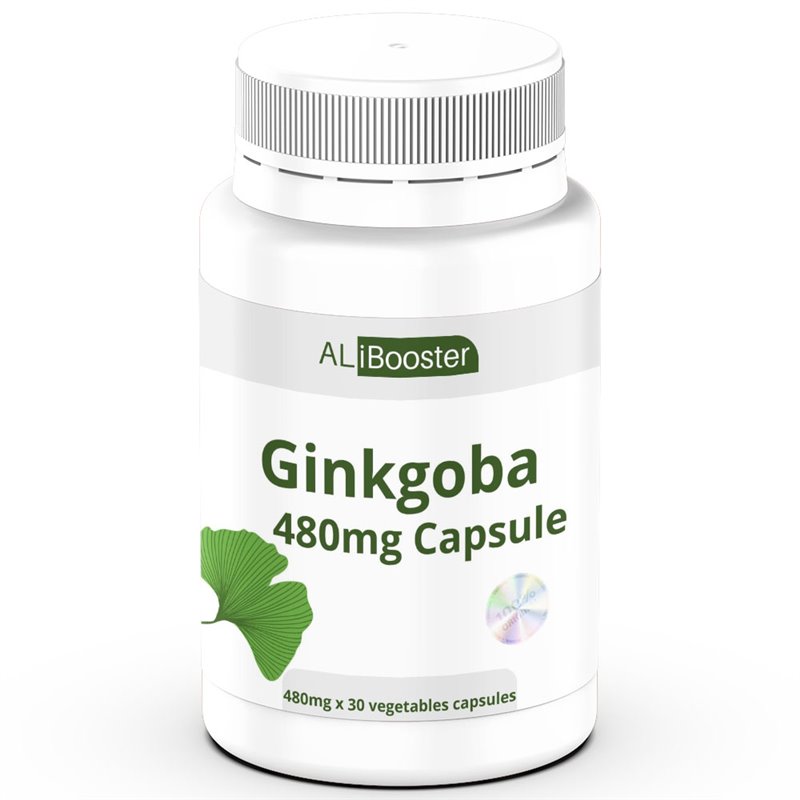



30x ginkgo Biloba capsules.
Each capsule contains 60mg of extract and 420mg of folium ginkgo biloba.
The Ginkgo biloba is appreciated for its support properties blood circulation and the cognitive function, often used for improve memory concentration and the general health of the cardiovascular system.
The food supplement based on Ginkgo biloba is known for its ability to improve blood circulation and support cognitive functions, helping to improve memory and concentration. It is also used for its antioxidant effects and its contribution to cardiovascular health, making it popular among those who seek to maintain a good brain function with age.
The Ginkgo biloba is an extremely ancient tree species, often described as a "living creature" because it is the last survivor of the Ginkgoal order, which existed more than 270 million years ago. These trees were formerly spread in many parts of the world, but in the modern era they are mainly found in the natural state only in some parts of China.
The Ginkgo biloba is from China, where it was cultivated for millennia and used in traditional chinese medicine. It is respected for its medicinal qualities and for its exceptional resistance and longevity.
Over time, the tree was introduced and cultivated in other parts of the world, particularly in Korea, Japan and later in Europe and North America. It is appreciated in cities for its resistance to pollution and its ability to tolerate difficult urban conditions.
In traditional Chinese medicine, the leaves and seeds of the Ginkgo biloba have been used to treat various diseases, including respiratory disorders, blood circulation problems and memory loss.
The leaves were traditionally used to make tea and the seeds were consumed, although the seeds require careful preparation because of their potential toxicity when they are raw.
Today, leaf extracts from Ginkgo biloba are widely used in dietary supplements around the world for their multiple health benefits, including improving memory and cognitive function, as well as supporting blood circulation.
The Ginkgo biloba is known under several different names that reflect its unique history and characteristics. Here are some of the most common names:
Ginkgo : The name most commonly used, derived from the Japanese name of the tree.
Tree to forty epics : This name was given in UK/Europe in the 18th century after a botanist paid 40 epics for a specimen, a considerable sum at the time.
Maidenhair Tree ( Venus hair tree): In English, this name is used as the leaves of the Ginkgo resemble those of the capillary fern (Adiantum), called Maydenhair fern in English.
Bai Guo : In traditional Chinese medicine, Ginkgo seeds are called Bai Guo.
Yin Xing : Another Chinese name for the tree, referring to the shape of the leaves that look like silver coins (yin).
Fossil Tree : In reference to its status as "living creature", being one of the oldest species of trees still alive.
Silver Apricot : Literal translation of its Chinese name, referring to the appearance of its seeds.
These different names highlight not only the botanical characteristics of the Ginkgo biloba but also its cultural and historical importance in different parts of the world.
Ginkgo biloba is widely studied for its various health benefits, mainly for its impact on cognition and circulation. Here are some of its most notable benefits and the scientific sources that support them:
Improved cognitive function and memory :
Effects on blood circulation :
Antioxidant properties :
Reduction of symptoms of depression :
Eye health :
These studies provide a solid scientific basis to understand how the Ginkgo biloba can be health benefits. However, as with any supplement, the results may vary from person to person, and it is recommended to consult a health professional before starting treatment with Ginkgo, especially in the presence of pre-existing medical conditions or taking other medications.
Take 1 capsule, twice a day, with a glass of warm water, after a meal.
A bottle contains 30 capsules.
Each capsule of 480mg contains:
Our food supplement is GMP, KKM, and HALAL.
Data sheet
Specific References
Your review appreciation cannot be sent
Report comment
Report sent
Your report cannot be sent
Write your review
Review sent
Your review cannot be sent

30x ginkgo Biloba capsules.
Each capsule contains 60mg of extract and 420mg of folium ginkgo biloba.
The Ginkgo biloba is appreciated for its support properties blood circulation and the cognitive function, often used for improve memory concentration and the general health of the cardiovascular system.